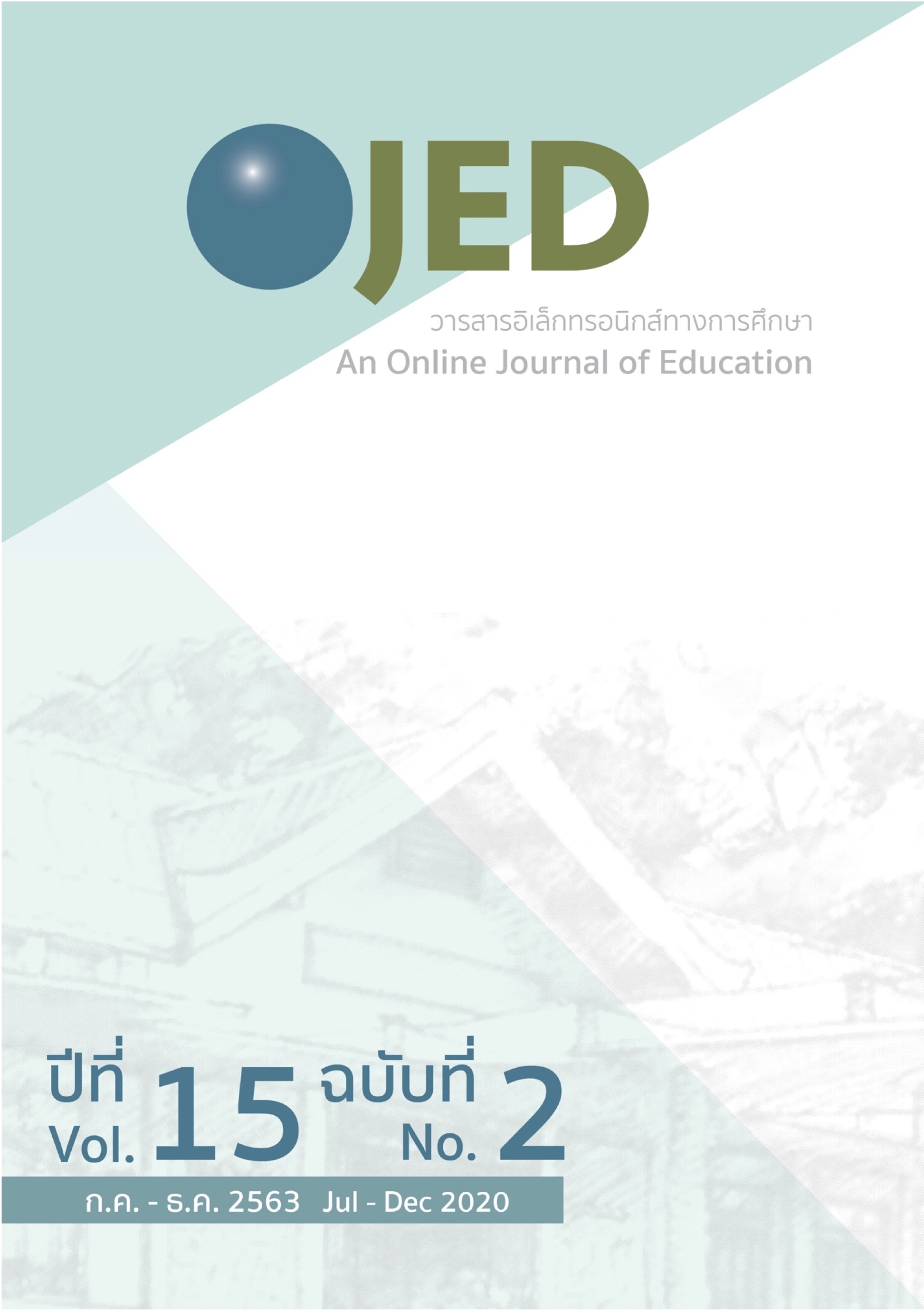Effects of Organizing Mathematics Learning Activities using 7E Learning Cycle and Higher Order Questions on Mathematical Problem-Solving Ability of Seventh Grade Students
DOI:
https://doi.org/10.14456/ojed.2020.15Keywords:
7e learning cycle, higher order questions, mathematical problem-solving abilityAbstract
The purposes of this research were 1) to compare mathematical problem-solving ability of students before and after using the 7E learning cycle with higher order questions learning activities, and 2) to study the ability to solve mathematical problems both in general and according to the sub - components of the students receiving mathematics learning activities using the 7E learning cycle with higher order questions classified by skill levels: high-achieving average-achieving and low-achieving groups between, before and after studying. The subjects of this paper consisted 35 students in an experimental group of seventh graders of an exceptionally large school in Pathum Thani during the second semester of academic year 2019 using purposive sampling. The instrument for data collection was the use of the mathematical problem-solving ability test. The data obtained were analyzed by using arithmetic mean, standard deviation, percentage, t-test, and content analysis.
The results of the study revealed that 1) the mathematical problem-solving ability of students in the experimental group was higher than that of before the experiment at a .05 level of significance, and 2) the mathematical problem-solving ability of students in the experimental group improved in a positive direction for all aspects, especially understanding of mathematical problem-solving ability, and the average-achieving group showed the most development in understanding of mathematical problem-solving.
References
สถาบันทดสอบทางการศึกษา. (2560). สรุปผลการทดสอบทางการศึกษาระดับชาติขั้นพื้นฐาน (O-NET) ชั้นมัธยมศึกษาปีที่ 3 ปีการศึกษา 2560.
สถาบันส่งเสริมการสอนวิทยาศาสตร์และเทคโนโลยี. (2551). ทักษะ/กระบวนการทางคณิตศาสตร์. กรุงเทพมหานคร: หจก. ส เจริญการพิมพ์.
สถาบันส่งเสริมการสอนวิทยาศาสตร์และเทคโนโลยี (2555). ทักษะและกระบวนการทางคณิตศาสตร์. 3-คิวมีเดีย.
สถาบันส่งเสริมการสอนวิทยาศาสตร์และเทคโนโลยี. (2560). สรุปผลการวิจัย PISA 2015: สถาบันส่งเสริมการสอนวิทยาศาสตร์และเทคโนโลยี.
สมเดช บุญประจักษ์. (2550). การแก้ปัญหา. วารสารคณิตศาสตร์, 51, 562-564.
อรวรรณ ตันสุวรรณรัตน์. (2552). ผลของการจัดกิจกรรมการเรียนรู้คณิตศาสตร์โดยใช้กระบวนการแก้ปัญหาเชิงสร้างสรรค์ที่มีต่อความสามารถในการแก้ปัญหาและความคิดสร้างสรรค์ทางคณิตศาสตร์ของนักเรียนชั้นมัธยมศึกษาปีที่ 2. (วิทยานิพนธ์ปริญญามหาบัณฑิต สาขาการศึกษาคณิตศาสตร์ คณะครุศาสตร์ จุฬาลงกรณ์มหาวิทยาลัย).
อัมพร ม้าคนอง. (2557). คณิตศาสตร์สำหรับครูมัธยม. กรุงเทพมหานคร: ศูนย์ตำราและเอกสารทางวิชาการ คณะครุศาสตร์ จุฬาลงการณ์มหาวิทยาลัย.
Anderson, L. W., Krathwohl, D. R., & et al. (2001). A Taxonomy for Learning, Teaching, and Assessing: A Revision of Bloom’s Taxonomy of Educational Objectives. Allyn & Bacon. Boston, MA (Pearson Education Group).
Bitter, G. G., & Gray, G. (1990). Mathematics Methods for the Elementary and Middle School: A Comprehensive Approach. Allyn and Bacon.
Eisenkraft, A. (2003). A proposed 7E model emphasizes ‘transfer of learning’and the importance of eliciting prior una’erstanding. The Science Teacher, 70, 6.
George, B. (1975). Microteaching: A Program for Teaching Skills. London: Butler and Tanner.
Muthma’innah, M., Dahlan, J., & Suhendra, S. (2019). Ability of mathematical critical thinking–what about Learning Cycle 7E model? Paper presented at the Journal of Physics: Conference Series.
Polya, G. (1973). How to Solve it, Nueva Jersey, Estados Unidos. In: Princeton University Press.
Saleh, H., Suryadi, D., & Dahlan, J. (2018). Promoting students’ mathematical problem-solving skills through 7e learning cycle and hypnoteaching model. Paper presented at the Journal of Physics: Conference Series.
Tofade, T., Elsner, J., & Haines, S. T. (2013). Best practice strategies for effective use of questions as a teaching tool. American journal of pharmaceutical education, 77(7), 155.
Downloads
Published
How to Cite
Issue
Section
License
Copyright (c) 2020 An Online Journal of Education

This work is licensed under a Creative Commons Attribution-NonCommercial-NoDerivatives 4.0 International License.




